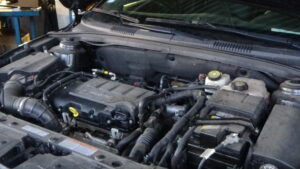 If you’ve owned a modern vehicle for even a few years now, then you’ve likely been in a situation when servicing your vehicle and asked if you’d like to flush the vehicle’s coolant, or brake fluid, or power steering fluid and wondered why it needed to be done. You might have even questioned the idea that it’s a scam of some sort thought up by the dealership to separate you from your hard earned dollars.
If you’ve owned a modern vehicle for even a few years now, then you’ve likely been in a situation when servicing your vehicle and asked if you’d like to flush the vehicle’s coolant, or brake fluid, or power steering fluid and wondered why it needed to be done. You might have even questioned the idea that it’s a scam of some sort thought up by the dealership to separate you from your hard earned dollars.
This couldn’t be further from the truth!
The fluids that are in your vehicle and used by specific systems are the lifeblood of your vehicle. You get your oil changed at recommended intervals, and the other fluids are no different. Let’s start with brake fluid, since your brakes are the most important safety feature. Brake fluid is a hydraulic fluid, and hydraulic fluid is meant to handle extreme pressure. One byproduct of pressure is heat. So over time as the fluid and the metal brake lines heat up and cool down moisture begins to build within the brake lines of your vehicle. While today’s brake fluids are made to withstand moisture, if the fluid is not changed the moisture begins to affect your brake pedal by making it feel squishy and not as solid as it used to be. It can also affect the seals inside the brake calipers and, in extreme cases of neglect, begin to cause your brake lines to rot from the inside out. Add that to all of the salt your vehicle drives through here in the northeast and it’s a recipe for disaster. So that is why it is recommended you change your brake fluid at regular intervals.
But what about other fluids in the vehicle like coolant or transmission fluid? Very similar. Let’s start with coolant. Nowadays most engine coolants in late model vehicles lasts up to, and in some cases over 100,000 miles. Though it is still a good idea to have your coolant checked over time, especially if you’ve ever added water into the tank by yourself as this can introduce contaminants into your cooling system. But the main reason for flushing your cooling system is to prevent rust build up. If rust begins to build up in the cooling system is can create blockages. If cooling pathways inside the engine become blocked with rust it can cause serious damage to your engine, in some cases, catastrophic failure. So while you likely won’t need to change your coolant for at least 100,000 miles, it’s always a good idea to have it checked at a certified Chevrolet service center.
Other fluids in your vehicle like transmission fluid and/ or differential fluid are very similar to engine oil, though they will require far less regular replacement due to the nature of their chemistry. Regardless, if you plan on keeping your vehicle for an extended amount of time, it is important to follow the unique scheduled maintenance program. This will ensure your vehicle runs issue free for years to come. Karl Chevrolet is here to answer any and all of your Chevrolet vehicle service questions. Feel free to contact us to discuss any and all maintenance questions you might have.
